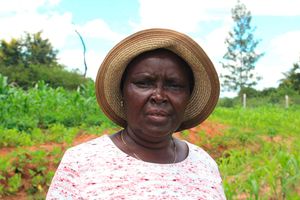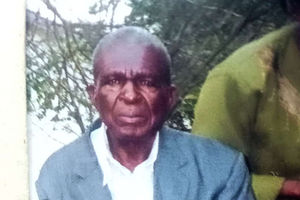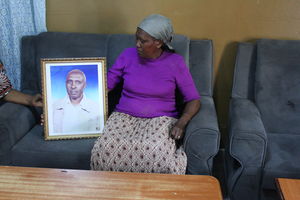
Landless by tradition: Women like Scholar Kimerinyang, Emily Longura and Susan Kekwanyang are being forcibly evicted by their own families and denied inheritance because of their gender, despite Kenya's constitutional guarantees.
It is 8 am on Monday, April 28, when we catch up with Ms Emily Longura at her one-room rented house at Kabichbich Trading Center in Pokot South sub-County. She is outside washing utensils with tears flowing down her cheeks.

Emily Longura, a victim of women's land inheritance bartering in Kabichibichi area of West Pokot on April 23, 2025.
The single mother of two has lived here for more than 10 years after she was kicked out of her father’s home by her brothers following a land row. They had rejected her plea to share in the inheritance of her father’s land.
Each of the six siblings was to receive a share of land according to a prior agreement, she says.
But after the death of their father, she says her brothers evicted her from their home.
“I was chased from home. They said I had no right to inherit my father's land because I’m a woman. They told me to go and get married,” Ms Longura recounts tearfully.
According to her, the threats escalated with her brothers hiring goons who nearly beat her to death.
“I took the matter to court. I feared for my life and for my children. But even after reporting the threats, they have continued harassing me,” she says.
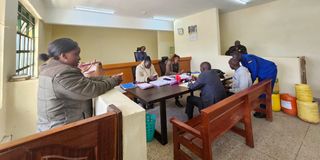
For Emily Longura, legal victories remain elusive, as male relatives ignore court rulings and local elders insist land disputes belong in customary forums, not courtrooms.
At the Kapenguria Law Courts, Principal Magistrate Stella Telewa acknowledged the gravity of Ms Longura’s case during a recent hearing.
“The suspects have been uncooperative since 2022. I order that they attend all future court sessions,” Ms Telewa ruled.
The court further advised Ms Longura to pursue a land case at the Environment and Land Court, as mediation through the council of elders had already failed.
The next hearing is set for May 28, 2025.
Ms Longura is among many women in Pokot battling for their share of family land.
Tradition still holds a firm grip on the lives of women in pastoral areas, especially when it comes to resource inheritance.
The entrenched cultural belief that only men should own and control family or clan resources has left many women landless, vulnerable, and voiceless.
Despite Kenya’s progressive 2010 Constitution, which guarantees equal rights to property for both men and women, women in the Pokot community continue to be denied the right to inherit land from their fathers and husbands. Centuries-old traditions continue to deprive them of the right to inherit land in accordance with the law.
Legal battles
In West Pokot County, a region dominated by pastoralist and agrarian lifestyles, land is a source of wealth, identity, and survival. But for many women, it is also a source of pain, humiliation, and legal battles.
Another victim is Rhoda Ruto, a 51-year-old woman from Kapsait sub-location. Her story is similar to that of Ms Longura. After her father died in 2019, her two brothers began pressuring her to leave the family homestead.
“They told me to get married. I’m the firstborn. My father gave each of us a portion of land before he died. They beat me so badly they broke my hand,” Rhoda says.
Now, unable to farm and without an income, Rhoda struggles to raise her children.
“My mother is too old and powerless to stop them. I can’t even farm to get food or pay school fees,” she laments.
She pleads for intervention. “I ask human rights groups to help us. The Pokot culture doesn't recognise us as rightful heirs, and yet we are the ones who take care of our children.”
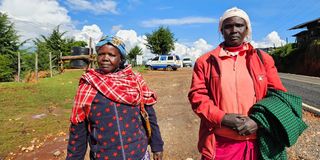
Despite Kenya's 2010 Constitution, Pokot women like Susan Kekwanyang and Scholar Kimerinyang are still denied inheritance on cultural grounds.
Ms Scholar Kimerinyang, a widow and second wife, says her late husband’s children beat her and served her with an eviction notice.
“They said I was a witch. I’ve gone to the police. The case is still in court. But I have no peace. They don’t even obey court orders. I’ve spent so much money just attending mentions.”
Her story stands out because she had a title deed, yet it wasn’t enough. Her estranged husband began selling her 15-acre piece of land behind her back.
“I went to court and placed a caution on the land, but he ignored the court order,” she says. “He burned down my house and called me a witch. The issue is that I gave birth to girls.”
Susan says the emotional and financial toll of the ongoing legal battle is immense.
“This land is all I had for my children. Now, we are scattered, living with relatives.”
Mr Nicholas Odhach, the Assistant County Commissioner for Pokot South Sub-County and chairperson of the local land board, says he handles numerous such cases.
“Every month, at least three women come to us saying they’ve been chased from their land either by brothers or their in-laws. We are trying to educate the community that the Constitution protects women, but it’s a slow process,” he says.
He notes that while mediation has worked in a few cases, many others fail due to the unwillingness of men to let go of tradition.
Wealthy man
Mr Masitait Lokeles, the chairperson of the Pokot Council of Elders in Pokot South sub-County, acknowledges that the Constitution permits women to inherit land from their parents. However, he insists that cultural considerations still play a major role in determining whether a woman receives land.
“If a woman is married to a wealthy man, she is not entitled to inherit her father’s land. But if she marries a poor man, she may return to her father's home and request a portion,” Mr Lokeles says.
Under traditional Pokot customs, he says, girls were historically not allowed to inherit anything from their parents. While the law has changed, he expresses scepticism about the effectiveness of court interventions.
“Women who go to court over land are wasting time. These issues are better handled by elders through mediation. Court cases drag on for years, while we, as elders, can weigh in quickly and find culturally acceptable solutions. That’s why we always advise the courts to refer land disputes back to the council of elders,” he says.


